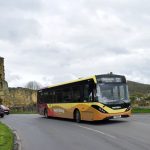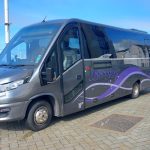Franchised buses will cost every household an extra £68 a year, says report commissioned by OneBus
Mayor Andy Burnham’s plans to franchise buses in Manchester could cost the public an extra £81m, says a report by the TAS Partnership.
Commissioned by OneBus, the association of Manchester’s bus operators, the report estimates that a franchise regime will cost every household in Greater Manchester an extra £68.10 every year, whether or not they use the buses.
It says the costs of operating bus services will increase dramatically in the first year of franchising and by up to 73% over the first seven years.
The report’s cost estimates, which include £1.1m on new staff at Transport for Greater Manchester, are based on replicating the existing network. Adding more routes and lower fares will increase the public cost further.
The report predicts that under franchising more drivers will be needed, and there will be an increase in dead mileage due to ‘away from home’ contracts.
Manchester is the first city to use powers in the Bus Services Act to propose a franchising regime. Over £20m has already been spent by Manchester’s local authorities on consultants for franchising.
Gary Nolan, Chief Executive of OneBus, says: “Franchising is being presented as a guaranteed route to better buses services, but there are potential costs that threaten to increase the financial burden on the public, whether or not they use the bus.
“This report sends a clear message to TfGM that the costs of operating the bus network are far greater than they imagine. Under a new partnership approach, operators would invest profit into improvements; under franchising, this investment would need to come from taxes. The only alternative to tax rises will either be higher fares or routes being cut.
“Immediate action from the local authority would be far better focused on congestion, which pushes up fares, harms air quality, increases journey times and damages the reliability of the bus network.
“Without urgent action from TfGM to tackle the growing number of cars on our roads, improvements will grind to a standstill, regardless of whether buses operate in a franchise or partnership.
“We do not believe the Greater Manchester public should be forced to pay for such a costly and unnecessary system. Our vision is a system fit for the future and that delivers regular improvements for the travelling public and boosts the economy of our region.
“We have already pioneered free wi-fi for passengers, integrated ticketing, have committed to 450 low-emission buses in the next three years, and introduced contactless payments years in advance of the tram system.
“We have much to be proud of in Manchester and should not be aiming to be a ‘second London’ with our transport network. We’d much rather be the ‘first’ Manchester and we expect the alternatives to be fully considered to avoid increasing the cost for taxpayers.”






















